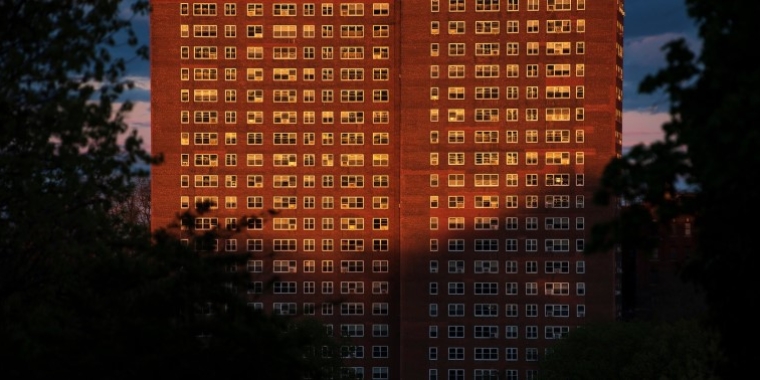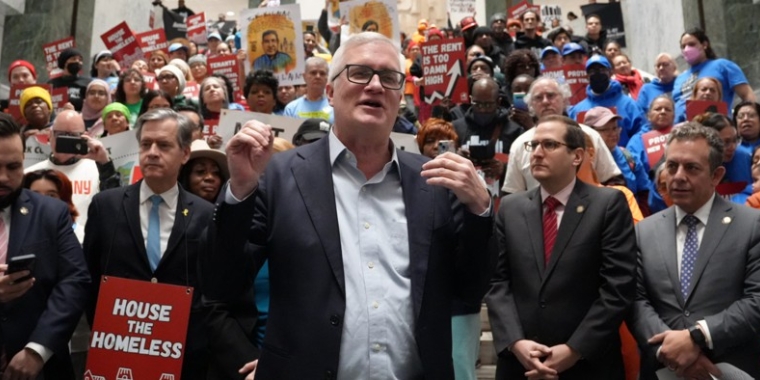
NY Times: A Moratorium on Evictions Ends, Leaving Thousands of Tenants Fearful

Housing courts in New York City reopened for virtual cases on Monday after a moratorium on evictions expired over the weekend. Credit: Karsten Moran for The New York Times
On June 22, 2020, Matthew Haag reported in the New York Times on the end of the moratorium on eviction cases that had been in place through June 20th in response to the COVID-19 pandemic, including the letter sent by Senator Kavanagh and dozens of his colleagues in the legislature urging the Governor to extend the moratorium. The full text of the article is below; the original version is available via the link above.
________________
A Moratorium on Evictions Ends, Leaving Thousands of Tenants Fearful
Eviction cases are expected to soar in New York City as housing courts reopen and landlords seek to recoup income lost during the pandemic.
By Matthew Haag
June 22, 2020
A moratorium on evictions that New York State imposed during the coronavirus pandemic expired over the weekend, raising fears that tens of thousands of residents struggling in the worst economic collapse since the Great Depression will be called into housing courts, which reopened on Monday.
Housing rights groups estimate that in the coming days, 50,000 to 60,000 cases could be filed in New York City’s housing courts. In addition, thousands of cases that were already in progress but were paused in March can now resume.
The number of eviction cases expected to be filed reflects the typical caseload in a three-month period, which was the length of the moratorium. But it does not take into account the fallout from the more than one million city residents who have lost their jobs or were furloughed in recent months and whose federal stimulus payments of an extra $600 per week will soon run out, housing advocates say.
A second order issued by the state that shields tenants directly affected by the pandemic expires in late August and could produce an even bigger wave of eviction cases.
“All levels of government have to realize that they cannot let tens of thousands of people end up in homeless shelters,” said Edward Josephson, the director of litigation and housing at Legal Services NYC. “It’s the most dire thing that we have ever seen.”
But many landlords say they, too, are facing financial calamity, with the loss of rental income leaving them unable to pay their own bills, including mortgages, and invest in building upkeep.
“It is clear that the economic impacts of the Covid-19 pandemic are nowhere near an end,” said Jay Martin, the executive director of the Community Housing Improvement Program, or CHIP, which represents about 4,000 property owners. “There are thousands of tenants and building owners who need help now.”
As housing courts nationwide begin to reopen and federal stimulus checks are about to end, eviction cases are expected to soar. A recent report by Amherst, an analytics and data real estate firm, found that up to 28 million renters are at risk of eviction.
In the days leading up to the first moratorium deadline, dozens of members of the New York State Legislature, as well as many housing groups, urged Gov. Andrew M. Cuomo to extend universal protection to all tenants, even in cases not directly caused by the pandemic.
They also expressed concern that housing courts would reopen physically on Monday, placing tenants and others at risk of contracting and spreading the virus.
But the state’s chief administrative judge, Lawrence K. Marks, decided against that, citing public health concerns. But case filings can be sent online or through the mail, and hearings will be held virtually.
Susanna Blankley, the coalition coordinator for the Right to Counsel NYC Coalition, said it was “unconscionable” for housing courts to restart at all.
“In what world is it good to evict people in the middle of a pandemic?” Ms. Blankley said. “Who are you opening for? It has to be for the landlords.”
Even though the courthouses were closed on Monday, people protested the virtual reopening outside the Brooklyn location, holding signs that read, “EVICTION FREE NYC.”
The past three months have been extremely difficult not only for tenants, but also for smaller landlords.
About 25 percent of renters have not paid rent in May, April and June, according to a survey by CHIP. About 20 percent of the landlords represented by the group said they were concerned about losing their properties.
Lincoln Eccles, who owns a 14-unit apartment building in Crown Heights, Brooklyn, said the closing of housing courts in March delayed two cases he had against separate tenants who have not paid rent in years. Together, the tenants owe tens of thousands of dollars in rent, he said.
Before the pandemic, Mr. Eccles said he expected to resolve those cases by July or August. With the courts’ closing and their typical snail’s pace even as they reopen, he does not expect a resolution for many more months.
He said he collected full rent payments from only nine of his 14 units this month; some of the tenants have not paid because of the pandemic, he said.
“If it’s a choice between me being solvent or the tenant staying in place, I have no choice but being solvent,” said Mr. Eccles, who said he was operating in the red this year.
Updated June 22, 2020
or difficulty breathing, call a doctor. They should give you advice on whether you should be tested, how to get tested, and how to seek medical treatment without potentially infecting or exposing others.
He is still paying off a $9,000 repair on the building’s boiler in February.
“Contrary to what the tenant advocates say, most of us landlords — the real landlords — going to court is the last option,” he said. “I don’t know of anyone who would knowingly evict someone who had a financial loss because of Covid.”
Nonetheless, eviction is an option that landlords do exercise. There were 37,000 residential evictions in 2018 and 2019 combined, according to the city, though the annual number has steadily declined in recent years. There were nearly 3,000 residential evictions this year before the moratorium took place.
Deborah Metts is worried she will be added to that list.
She lost her marketing executive job in March and could not afford the next month’s rent on her Harlem apartment. Since then, Ms. Metts has helped start a tenant association in her building, organized a rent strike among some tenants and asked the property owner to give residents a break on rent. (The company has not responded, she said.)
“The last few months for me have been scary and really eye-opening,” Ms. Metts, 37, said. “The minute you go from privilege, in a sense of still being employed, to having nothing — things change very quickly.”
She said she was more concerned that her neighbors could face eviction proceedings and have no place to go if they lost their homes.
Of the ZIP codes in New York City with the most evictions in 2018 and 2019, people of color make up more than 96 percent of the population in those areas, according to census data. All of them were in the Bronx or Brooklyn.
“When we talk about evictions, the vast majority of those people will be black and brown people,” Ms. Metts said. “If society cares about social justice, one of the places they need to put their money where their mouth is is in eviction prevention.”
About 2.3 million tenants in New York City recently received slight relief on their future rent. The city’s Rent Guidelines Board, which sets rates for rent-regulated apartments, froze those rents for a year; it was only the third time the board had not approved a yearly increase in its 50-year history. The freeze does not affect market-based rents.
Across the country, including in New York, tenants have rallied around a broad #CancelRent campaign, criticizing eviction moratoriums and rent freezes as inadequate during the economic turmoil.
For the past several months, MD Khan, a cabdriver, has been receiving letters from his landlord titled “Notice of failure to pay rent.” Mr. Khan, 57, said he stopped driving in mid-March because he worried about contracting the virus.
Still not working, he has not been able to afford his $1,175 rent on his studio apartment in Jamaica, Queens, since March. He said he believed the letters were the first step in his landlord eventually taking him to housing court.
“I don’t have a job,” Mr. Khan said, “and I don’t have income.”
________________
Matthew Haag covers the intersection of real estate and politics in the New York region. He previously was a general assignment and breaking news reporter at The Times and worked as an education reporter at The Dallas Morning News. @matthewhaag



